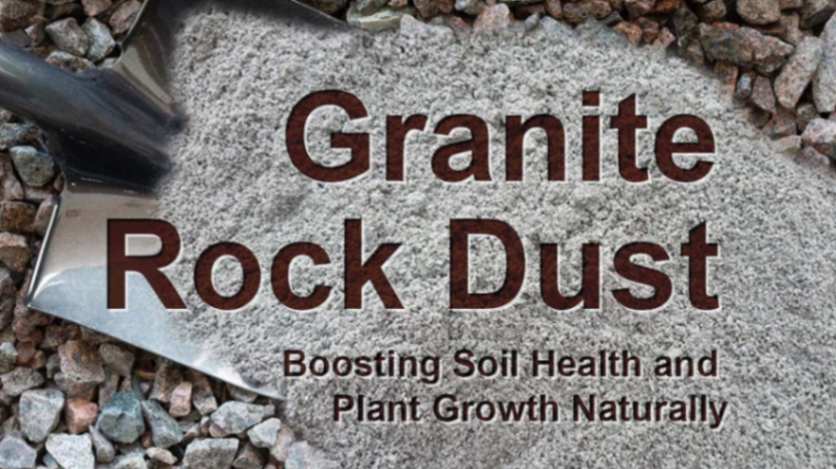Granite rock dust is a type of natural mineral that has been gaining recognition for its ability to enhance soil health and promote healthy plant growth. It is made from finely ground granite, which is an igneous rock composed mainly of quartz, feldspar, and mica. Like other rock dusts, granite rock dust is highly valued in gardening and agriculture for its mineral content and the benefits it provides to soil and plant health. In this article, we will provide a detailed overview of granite rock dust, including its mineral compositions, properties, typical analysis and advantages for gardening.
What Is Granite Rock Dust?
Granite rock dust is a finely crushed powder made from pulverizing granite rocks. It contains a plethora of essential minerals, including silicon, calcium, potassium and magnesium. These minerals play a pivotal role in improving soil structure and plant nutrition.
Mineral Compositions
The exact mineral composition of granite rock dust can vary slightly based on the geological origin of the granite, but these minerals are primarily composed of the following minerals.
- Quartz: Quartz is abundant in granite and provides stability to the soil structure.
- Feldspar: Feldspar contributes to the nutrient content of the soil, supplying elements like potassium, calcium and sodium.
- Mica: Mica contains potassium and other essential plant nutrients.
- Trace Minerals: Granite rock dust also contains trace minerals, which vary depending on the specific granite source. These trace minerals can include iron, magnesium, and various others.
Properties
Granite rock dust is typically ground into fine particles, with sizes ranging from a few microns to several millimeters. It often has a gray or pinkish color and a gritty texture.
Typical Analysis
The mineral composition of granite rock dust can vary based on the source rock, but a general analysis might include:

Granite Rock Dust Benefits for Gardening
Granite rock dust offers several advantages for gardening and agriculture:
- Enhanced Soil Mineral Content: Granite rock dust adds essential minerals to the soil, which can improve soil fertility. This includes macronutrients like potassium and calcium, which are crucial for plant growth.
- Improved Soil Structure: The fine particles in granite rock dust help break up compacted soil, enhance aeration, and increase water retention. This results in improved soil structure, root development, and overall plant health.
- pH Buffering: Granite rock dust can buffer soil pH, helping to maintain it in a suitable range for plant growth. This is particularly valuable in acidic soils.
- Nutrient Availability: The minerals in granite rock dust release slowly over time, providing a continuous source of nutrients for plants. This steady supply of nutrients can lead to healthier and more productive plants.
- Sustainable Gardening: The use of granite rock dust is considered environmentally friendly as it utilizes a natural resource, reduces the need for synthetic fertilizers, and promotes sustainable gardening practices.
- Trace Minerals: Granite rock dust often contains trace minerals that are important for plant growth, even though they are required in smaller quantities. These trace minerals contribute to overall plant health and vitality.
Conclusion
Granite rock dust is a valuable soil amendment due to its mineral content and benefits for gardening and agriculture. It enhances soil fertility, improves soil structure, helps maintain optimal pH levels and provides a steady supply of essential nutrients to plants. Gardeners and farmers often incorporate granite rock dust into their soil management strategies to support healthier and more productive crops.
FAQs
Is granite rock dust safe for organic farming?
Yes, granite rock dust is considered safe for organic farming as it is a natural mineral product that does not contain synthetic chemicals.
How often should I apply granite rock dust to my garden?
The frequency of application depends on the specific needs of your soil and plants. Generally, an annual application is sufficient for most gardens.
Can granite rock dust be used in potted plants?
Yes, granite rock dust can be used in potted plants to improve soil quality and nutrient availability.
Is granite rock dust suitable for all types of soil?
Granite rock dust can benefit most types of soil. However, it is particularly effective in soils that are nutrient-deficient or overly acidic.
Also Read
Basalt Rock Dust: A Natural Fertilizer for Your Garden
Creative and Sustainable Use of Sawdust in Everyday Life

Leave a Reply